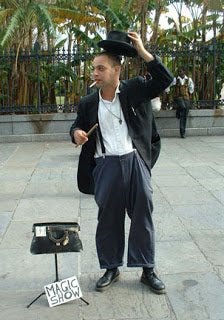The Street Show Intro And Why It's So Important.
-busking techniques and strategies.
Years ago as a beginner, after I learned The Show Intro from my teachers, I noticed more than half of my problems went away.
Every show just seemed to go as I wanted them to every time, and my tips doubled.
I got more audience cooperation, crowds built up bigger, I had less walk offs, less hecklers, and more money.
So what is this magic elixir?
First you will need to stop some people and bring them in.
These first two steps are called The Bally and The Call Forward.
After a busker stops some people and calls them into his area to watch his show, he will do The Show Intro to inform the new audience who he is, and what he is going to do.
If done right they already anticipated it and were vindicated in suspecting the performer was a Pro.
This builds a strong commitment and rapport with a new audience, because they believe they are watching something professional amongst friends, this can be very comforting for them in the chaos of an inner city street, where no one knows what to expect.
The Show Intro is a very important technique, because it will get a group of casual spectators to commit to stay for an entire show, without ever walking off in the middle of it.
Without an Intro you will notice people peeling off throughout your show, because there is no family commitment without it.
In short, The Show Intro is a brief scripted routine done immediately before the show that introduces the performer and his show to a new audience.
It's a meet & greet, where the performer tells them who he is, where he's from, where he's been, and where he hopes to go.
He tells them what's in his show, why it's so great, and how long it is.
Creating structure and controlling the attention of random strangers on a chaotic city street is simply a day at the office for a busker.
He has a toolbox full of techniques and this one checks all the boxes, because it solves problems before they can even begin.
The Show Intro lays the ground work for what the performer wants to do later on in his show, without having to worry about walk-offs.
If a spectator stays put through the entire Show Intro, he is sending a message that he's all in, he's not going anywhere, and if the performer keeps his promises as a performer, the spectator will keep his promise as an audience member.
In my close up Show Intro, I tell them my name is Jimmy, I'm from New Orleans, I'm a sidewalk performer who travels around the world.
I tell them my show is 5 mins long, I do three tricks, one is a coin trick which is the hardest trick I know, the next one is the oldest trick in magic from ancient Egypt done with a cup, and the last one, my grandfather taught me and it made me famous on the internet, all done with a piece of rope.
After I tell them these things I move quickly into the first trick I promised.
My Intro is a routine written like any other routine, it is filled with jokes and one-liners. I didn't write out my own script here, because I wanted to emphasize the things that are important to the audience when you go to write your own script.
For instance, they know my name and feel like they have met me, and they know the show is 5 mins long and can judge if they have that kind of time to stick around and watch a magic show.
It should be noted my close up show can run a lot longer than 5 mins, but 5 mins is very little time to ask for someone to stay on a downtown street, and I've never had anyone complain even if the show went up to twenty minutes.
Depending on the crowd I may want to end early and I could certainly do that if I only promised 5 mins.
Whelp, I hope this helps, I know it helped me out a lot when I learned about it.
Your Pal Jimmy


I've been working on my script and will apply these tips as soon as possible. Thank you.
I've seen your writing on the Bally, but I don't recall whether you've talked about the Call Forward.